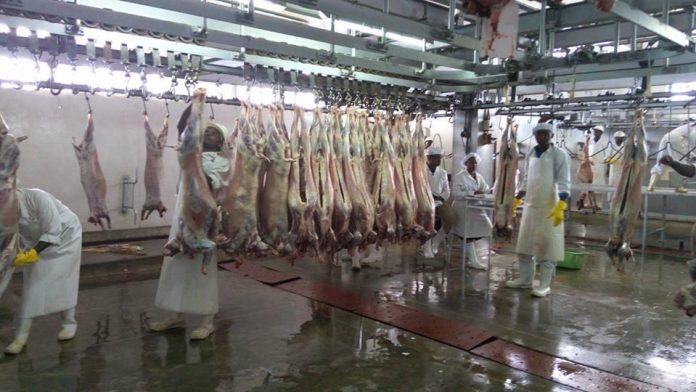Written By Monica Makali ||
Fifty-Seven Kenya Meat Commission employees have graduated after successfully completing the slaughterhouse attendants course at Meat Training Institute in Athi River, Machakos County.
The workers were each conferred with a certificate during the graduation ceremony held at Meat Training Institute on Friday, October 28.
KMC managing commissioner Brigadier James Githaga said the commission had crafted an MOU with MTI based on Competence-Based Education and Training through targeted and scheduled training for the development of KMC staff skills.
“Today graduands of the slaughterhouse attendant course stand out as the pilot course output of the KMC/ MTI MOU agreement,” Githaga said.
Githaga spoke during the graduation ceremony also attended by the graduands’ family members.
He said the training was meant to impact necessary skills which will create career growth, motivate staff and increase work efficiency, impact slaughtering skills of cattle and goats, and build capacity for the trainees to effect hygienic processes and practices in the slaughterhouse.
The managing commissioner said the training was also intended to enforce proper inspection, grading, and processing of meat and meat products in line with KMC’s Business Mantra, “A Cut Above the Best!”, foster career growth, and contribute to the reduction of the National Meat post-harvest loss by proper hygienic handling.
He said 14% of meat per animal was lost during slaughter time nationally.
“As we celebrate the fifty-seven (57) graduands, I want to thank you for balancing job performance, family, and training at the same time. Congratulations and well done!” Githaga said.
KMC was established on June 1, 1950, through an Act of Parliament, Cap 363 of the laws of Kenya.
Ministerial responsibility of the KMC was transferred to MOD from MOALF through a directive by HE the President vide a Memo ref MOALF/CS/ADM/30 dated 07 September 2020.
He said the placement of staff brought about gaps in general processes hence the need for training to enhance career progression, efficiency, and effectiveness in production.
Githaga thanked KMC’s Board of Commissioners for authorizing the undertaking of the training.
“I thank the MTI management and fraternity for your commitment to offering the lessons out of your busy schedule and giving it at a discounted rate in terms of fees, I thank the KMC management for synching the training to avoid affecting KMC’s normal operations. I thank the families for supporting the staff during the entire training duration,” Githaga said.
He said KMC was further going to collaborate with MTI in undertaking further upgrading and specialized Courses for the graduands, other KMC staff, and departments to ensure professionalism, effectiveness, and efficiency in our operations.
“KMC Board of Commissioners, management, and staff wish you the graduands the very best in your current and future endeavors. Keep scaling greater heights,” he said.
MTI principal Dr. Salome Kairu the purpose of the graduation ceremony was to mark the successful completion of the Slaughter House Attendant’s Course by the staff of the Kenya Meat Commission.
Kairu said it was commendable that KMC had taken a special role in the meat sector to deliver meat to the Kenya citizenry and to countries beyond the Kenya borders to a ‘Cut above the best’.
She said MTI’s vision was to train personnel from the meat trade and industry in the hygienic production, inspection, and processing of meat and meat products.
“I want to single out the contribution of the Kenya Meat Commission over the years in the training of meat handlers and meat processors in Kenya and beyond. The collaboration in this endeavor has been a strong one,” Kairu said.
She said KMC had offered the opportunity for the Meat Training Institute to use its facilities for practical training purposes without reservations.
Kairu said the successful training of 57 KMC staff on the slaughterhouse attendants’ course was a testimony of the strong collaboration and the commitment of the KMC administration to support the Vision of the livestock sector.
“There is strong evidence of support of the livestock sector by the Kenya Meat Commission in other areas too. These include absorption of a good number of graduates and former staff of the Meat Training Institute, both young and older in the jobs available at the KMC who we believe are instrumental in further, in-house training of slaughter personnel,” She said.
She said the slaughterhouse attendants course was appropriate for KMC staff as it had provided them with the skills to participate in slaughterhouse operations.
Kairu said the skills included those of slaughtering cattle, sheep and goats.
“This is an animal welfare issue that is regarded with utmost importance globally, hygiene practices in the slaughterhouse, a food safety issue, knowledge on the value of slaughtering food animals hygienically, knowledge on the value of hygienic transportation of meat and knowledge on the value of slaughterhouse by-products (blood, manure, horns, bones) and their proper handling,” she said.



















